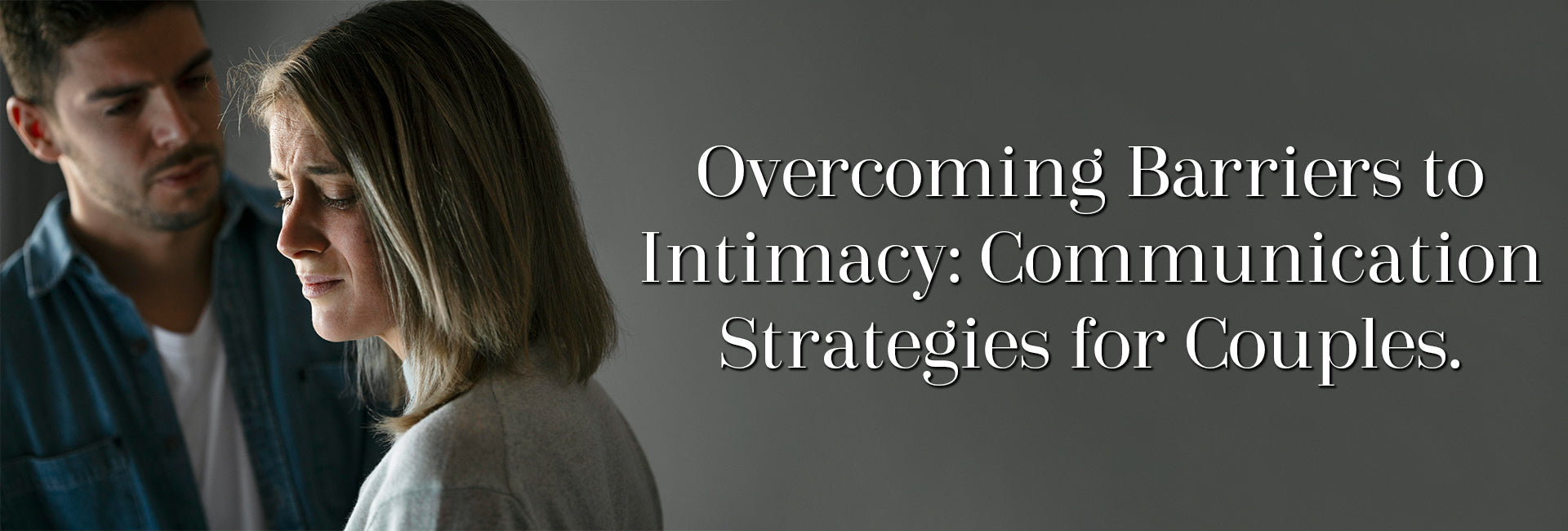Overcoming Barriers to Intimacy: Communication Strategies for Couples
Overcoming Barriers to Intimacy: Communication Strategies for Couples
Emotional barriers or unresolved concerns will create a sense of misunderstanding between partners. They can also hinder the ability to be vulnerable and fully present to another. These barriers will manifest as reluctance to talk about feelings, unresolved conflicts. Recognizing the presence of emotional barriers is the first step towards addressing them and fostering yourself from your partner. This disconnect will lead to frustration or rejection that can further hinder emotional connection.
Recognizing Emotional Barriers in your Relationship
Identifying emotional barriers in your relationship will help you to overcome them. To stay connected, couples can work towards becoming more self-aware and open to addressing potential barriers. Some of the common signs of emotional barriers includes:
1) Difficulty in expressing emotions
2) Frequent Misunderstandings
3) Lack of Physical Intimacy or Touch
4) A tendency to feel emotionally distant from your partner.
If you notice these signs in your relationships then they may indicate the presence of an emotional barrier which requires attention.
An Honest conversation with your partner
Communication with your partner will help you in identifying and addressing emotional barriers. An open honest conversation about how you feel and concerns will help you both to understand underlying challenges. By recognizing emotional barriers, you can work together to overcome them and strengthen your connection.
Engage in the self-assessment
Are emotional barriers affecting your relationship?
You can reflect on your interactions with your partner to identify emotional barriers. Do you feel a sense of emotional distance? Self- Assessment will help you pinpoint particular challenges that need to be addressed.
How to overcome emotional barriers through communication
You can form an effective communication to overcome foster intimacy and emotional barriers. Communication can be learned through consistent practice and willingness to understand your partner’s perspective.
Tips for an Effective Communication
To improve communication, you can take steps to better understand your partner’s needs and express your own. Some of the tips which you can follow to overcome foster intimacy and emotional barriers through the communications:
1) Active Listening : Sometimes, we listen to give a response rather than understand. Active listening involves focusing on what your partner says, summarizing the thoughts to ensure you fully understand.
2) Compromise : Finding compromise will create a sense of balance and mutual understanding. Compromise does not always mean to give up your needs but finding a middle ground that works for both the partners.
3) “I” Statements : Other than blaming your partner for a problem , you may use “I” statements to express how you feel and what you need. This approach can reduce defensiveness and foster understanding.
4) Prioritizing Kindness and Respect : Respect and kindness shows that your partner that you value and care for them. When you are prioritizing these qualities then it can create a more understanding and positive environment .
5) Honesty and Vulnerability : It is crucial to discuss your fears, concerns and feelings and your partner will create a deeper sense of intimacy. This requires trust and vulnerability that can bring you closer together.
6) Trust Issues and Past Trauma : Heartbreak or the past experiences of betrayal can actually make it challenging to trust others and form close relationships. You can also seek support from the therapist or counsellor to process unresolved trauma and learn healthy strategies. You can practice forgiveness and permit yourself to heal at your own pace.
Understanding Intimacy
Intimacy is a multifaceted concept that has people’s physical, psychological and emotional closeness with others. Also, this type of connection includes a deep sense of trust when two people feel safe to be vulnerable. Intimacy exists between family members, close relationships, and romantic partners. There are some types of intimacy to be aware of which includes feelings, thoughts and experiences. Moreover, this type of intimacy is often present in all relationship types and deepens as individuals get to know each other. There are some types of intimacy to be aware of, which includes but not limited to the following:
1) Emotional Intimacy : People who are emotionally intimate when they share personal feelings, thoughts and experiences. This type of intimacy is present in all types of relationships as individuals get to know each other and spend more time together.
2) Physical Intimacy : Physical Intimacy involves showing affection through physical closeness and touch. This connection can be the part of familial relationships like children and parents, romantic relationships including sexual intimacy and even sometimes close friendships too.
3) Psychological Intimacy : Psychological intimacy relates to the mutual understanding and respect for each other’s innermost self. Also, known as intellectual intimacy, this type forms as you develop a sense of how another person sees the world.
Experiential and Spiritual Intimacy will also occur in personal relationships. Understanding several ways intimacy can manifest will help you work through your fear of intimacy. If there is one type of intimacy that you struggle with you may try cultivating other types within your relationships to build trust and practice vulnerability. Some people who fear intimacy in a physical sense will try to build up an emotional bond with another person before becoming physical.
Why Intimacy is Crucial?
Intimacy is a crucial facet of close relationships. Without this part of a connection, individuals will struggle to healthily connect with others or forge relationships. In extreme cases, a lack of intimate relationships will result in loneliness and social isolation. In healthy romantic partnerships, intimacy will act as the glue that holds the relationship together and create a foundation of security, trust and mutual understanding. Although, the fear of intimacy can also be pronounced between romantic partners where all the encompassing nature of the relationship that are physical, emotional and psychological elements will be overwhelming.
Fear of Intimacy: Signs to look for
Identifying the different signs of fear of intimacy will be the initial step towards addressing and overcoming it. Some of the signs to be aware of:
1) Fear of Commitment
2) Avoidance of Physical Touch and Affection
3) A pattern of Short-Term relationships
4) Low Self-Esteem
5) Trust Issues
6) Fear of Vulnerability
7) Impact of a fear of intimacy on romantic relationships
A fear of intimacy will be particularly damaging to the romantic relationships that are limiting an individual’s capacity to initiate and sustain healthy intimate partnerships. By identifying how this fear will impact intimate relationships, you may be better equipped to make meaningful changes.
1) Emotional Distance
Fear of intimacy will make sharing one’s feelings, thoughts and experiences with a partner difficult, leading to the lack of emotional connection. A lack of connection will be the reason behind isolation and loneliness within the relationship, as one or both partners will believe their emotional needs are unfulfilled.
2) Communication Issues
Effective communication is vital for a healthy romantic relationship. However, fear of intimacy can cause people to avoid difficult conversations or default indirect communication techniques. Doing so can result in misunderstanding and unresolved conflicts that will strain in the relationship.
3) Trust Issues
Trust is considered as a cornerstone of intimate relationships. Moreover, when fear of intimacy is present, individuals will struggle with constantly fearing rejection or betrayal. This lack of trust will cause partners to become suspicious or insecure about each other’s actions and intentions that can fray the relationship.
Understanding Issues with Physical Intimacy and Sex
Physical Intimacy and Emotional Intimacy are closely related within the romantic partnerships, so a fear of emotional intimacy will complicate sexual and physical intimacy. Individuals will be uncomfortable with the vulnerability and trust that are often required within such interactions.
1) Understanding Your Fear
An initial step will reflect on the fear of intimacy and consider the common barriers. You can also identify the past relationship that will end in hurt and maybe you recognize some characteristics of an insecure attachment style.
2) Overcoming Fear of Intimacy
Overcoming the fear of intimacy is a gradual process that involves understanding the roots of the fear and exposing oneself to the feared situations in this case. While this process initially will be uncomfortable and progressive engagement with intimacy will become more natural as you successfully navigate these situations. Moreover, you can educate yourself, journalize with a therapist for a better understanding of the roots of fear.
3) Build trust gradually
Making trust gradually often takes time and will involve a level of vulnerability. You can start with the minor steps, building towards the increasing level of dependence, self-divulgence and faith in a person. You may also start sharing each and every detail of the moment or how your day went so far. Before you share small details, you can work on your innermost secrets or ask small favors to gauge a person's reliability in crucial situations.
4) Discuss about how you feel and fears
People may become more sympathetic when they will understand your issues/ traumas of what you went from. Particularly at the onset of a new relationship, people will find it helpful to discuss the fear of intimacy and explain the challenges to the partner. Moreover, communication will also prevent misunderstandings and open the door to more intimate conversations when you are ready for them.
5) Practice Vulnerability
While potentially-inducing, you can try to practice vulnerability within your relationships. You may share a painful experience with your partner or loved ones without having insecurity or fear. With this process, you may prove to yourself that the vulnerability is not necessarily harmful. Instead, you can notice these moments that will bring you closer to others.
6) Form an Emotional Awareness
Emotional Awareness is a skill which allows you to recognize your emotions and understand how they will affect your behavior that will potentially help you in navigating through uncomfortable or painful situations. Journalizing and emotional regulation techniques will be helpful for developing this skill. You can also try learning the names of emotions and how they can feel in the body.
The Role of Therapy in Overcoming Intimacy Problems
Therapy plays an important role in overcoming Intimacy problems. A well-trained therapist will provide a non- judgemental space and neutral for couples to express their concerns, understand each other’s perspectives, and develop effective tactics for forming intimacy. With couples counseling, couples can practice and learn essential skills like conflict resolution and couples communication. They will gain insights into their own emotional patterns and explore different ways to address emotional and physical barriers which may be hindering intimacy.
The main benefit of taking therapies will extend beyond the therapy room. Moreover, couples will also apply the skills and techniques they learn during the therapy in their day to day lives. Nurturing intimacy, physical affection through quality time will benefit the couples.
Final Thoughts
If your romantic partner is the one who demonstrates intimacy avoidance, all hope is not lost. You can also help them in identifying and overcoming the fears and in turn, it works towards your relationship. It is crucial to understand your partner and their needs. Do keep in mind that the intimacy issues may be hurtful and they cannot open up right away so it is best to avoid any negative attitudes or thoughts. You can also encourage your loved ones to seek therapy and be patient. Don’t forget that the fear of intimacy is not personal.
There will be several causes of fear of intimacy including but not limited to the mental health concerns, negative past experiences. This fear will help in making building healthy relationships challenging. Overcoming a fear of intimacy will also involve understanding your fear and gradually building trust and vulnerability with others.



